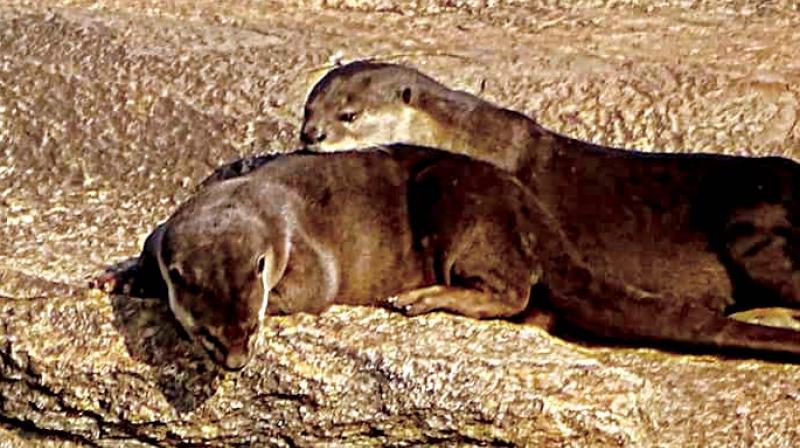On the banks of Tungabhadra, a home for the otter
The Forest department has declared a distance of 34 km downstream of Tungabhadra an Otter Conservation Reserve'.

Ballari: They are tiny creatures, bobbing in and out of the Tungabhadra river and sunning themselves on the rocks abutting it. While they are a tourism attraction, they are also easy game for poachers.
Weighing just about 2 to 6 kgs, the oriental short-clawed otters, also known as the Asian small-clawed otters, are the smallest otter species in the world and are endangered.
Currently, they find mention both in the International Union for Conservation of Nature (IUCN) Red List of Threatened Species and the country's Wildlife Protection Act of 1972.
For long the otters were killed by Bangladeshi immigrants living in Sindhanur taluk of Raichur, reveal wildlife activists. Specialised poachers of otters and turtles, they went unchecked until the trade in otters was busted in 2012. But still the racket continues.
Waking up finally to the threat the creatures are under, the state’s Department of Forest, Environment and Ecology, declared a distance of 34 km downstream of the Tungabhadra river an ‘Otter Conservation Reserve’ through a gazette notification last July.
The reserve stretches from Mudlapura village near the dam in Koppal taluk till the bridge over the river in Kampli , Hosapete taluk , Ballari district, passing through the ruins of Hampi, where it is an added tourism attraction.
And now in more conservation steps, the area will be declared an otter sanctuary once anti-poaching teams are formed and other infrastructure is put in place, says Range Forest Officer, T Bhaskar of the Kamalapur range.
The declaration may have taken a while in coming but it has enthused wildlife enthusiasts, who are hoping it will help save the little otters from extinction in the river. They note that while the Cauvery and Kali rivers, that are home to the otters as well, are protected by wildlife sanctuaries and tiger reserves around them, the Tungabhadra region had no such protection despite its rich aquatic life.
Besides being home to a healthy population of smooth clawed otters, the river here has a good number of Eurasian and smooth-coated otters, the famed mahseer fish, fresh water crocodiles and giant soft shelled turtles.
But the otters in the Tungabhadra are not only under threat from poaching, but also sand mining and discharge of untreated effluents into the river, the activists say .
“Villagers on both sides of the river cultivate sugarcane, banana, paddy, groundnut and maize and the increasing presence of humans has put otter population under pressure,” they point out.
Once the reserve area is declared a sanctuary, people will be allowed to stay and continue with their normal lives, but in a regulated manner. Fishing will be regulated and conservation steps taken, explain forest officials. Also, no drinking water or hydel projects will be allowed to come up around the Tungabhadra as they could affect the otter population.

